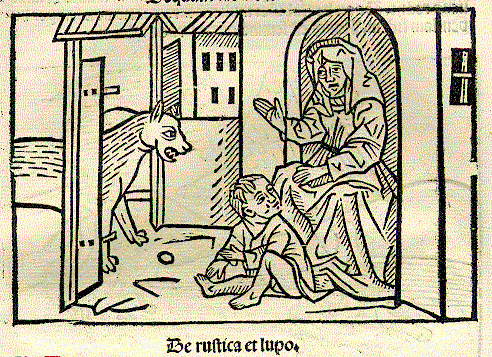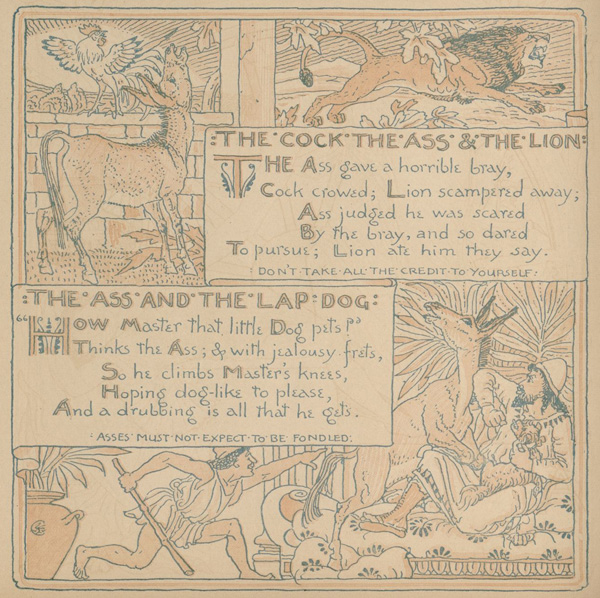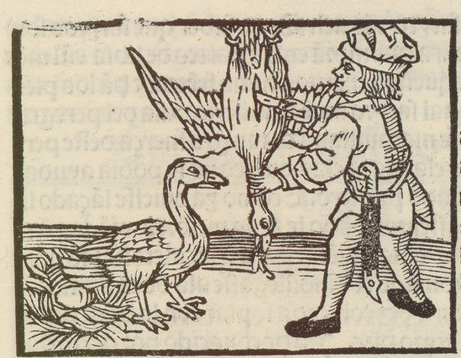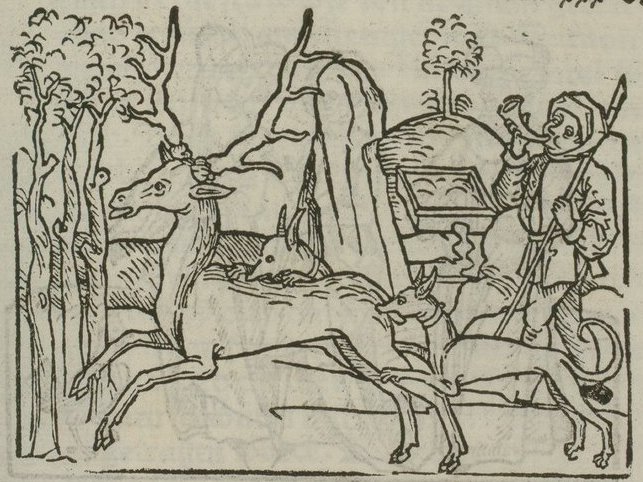There are so many things I like about this book. First, the fables as adapted from LaFontaine are fun and lively. LaFontaine was one of the most gifted storytellers in the Aesopic tradition, and turning his French poetry into Latin prose yields some excellent reading material for students, which can then be connected with classical, medieval, and Renaissance Latin versions of the same stories which LaFontaine has told. Moore has chosen 50 fables for the book, some of which are classical Aesop's fables, and some of which represent the eastern fables which LaFontaine helped to popularize in the European tradition. You can see the contents of the book listed here, with links to the individual fables.
The fables are presented with macrons for the long vowels and some very helpful raised dots to help students find the natural pauses when they read. This is an economical way to achieve the same thing I try to achieve with my "segmented" way of presenting Latin texts (anyone who has been reading this blog is familiar with the way I do that). There is a glossary in the back of the book, and there are also notes for each fable, plus an introduction that outlines some good strategies for reading Latin prose. My only disappointment with the book is that the notes do not take a systematic approach to some admittedly challenging Latin constructions. If I do get around to republishing the book, I would probably want to supplement the notes, just to make sure students get all the help they need if they are stymied in their understanding of the Latin.
Anyway, to give you a sense of this delightful book, here is one of the first fables it includes, a very short one: the story of the fox and the grapes, a classical Aesop's fable which actually gives us the modern catch-phrase "Sour grapes," although few people know anymore that the story comes from Aesop. Here is Moore's Latin prose version of the story - I've tried to reproduce here his elegant solution to including the pauses in the story (although I have not included the macrons):
Vulpes quaedam · fame confecta, uvas · de pergula pendentes · maturas, ut videbatur, et purpureas · conspicata, eas · quamvis cupida · attingere non poterat. Itaque · "Acerbae" · inquit · "adhuc sunt, calonibus tantum · maturae!" Num melius fuisset · gemere ac lamentari?The two unusual words here are glossed as follows in the complete glossary provided in the back of the book. As you can see, the glossary make some effort to promote an etymological understanding of Latin word derivation by referencing the verb pergo for the noun pergula. Nice!
calo, calonis (m.): camp-follower, servantYou can see that as he has rendered LaFontaine in Latin prose, Moore has still managed to convey some of the spirit of LaFontaine's original French verse (with Moore's calones standing in for LaFontaine's goujats, for example):
pergula, pergulae (pergo): projection, shed, arbor, trellis, pergola
Certain Renard Gascon, d'autres disent Normand,As you can see, LaFontaine takes the approach to this story that you see also in Steinhowel's version, suggesting that it might be psychologically positive for someone to just say "sour grapes," as the fox does, rather than to torture themselves with regret and remorse for something they cannot have. Other versions of the story, of course, criticize the fox for being a hypocrite, someone who criticizes the grapes only because they are out of reach. Those grapes look very good indeed, after all, something not just suitable for Latin calones and French goujats!
Mourant presque de faim, vit au haut d'une treille
Des Raisins mûrs apparemment,
Et couverts d'une peau vermeille.
Le galand en eût fait volontiers un repas ;
Mais comme il n'y pouvait atteindre :
"Ils sont trop verts, dit-il, et bons pour des goujats. "
Fit-il pas mieux que de se plaindre ?
For a complete list of the version of this fable that I have found, see del.icio.us/aesopus/perry015. (Yes, I've decided to start cataloging the fables with del.icio.us tags - I'll be explaining more about that in future posts!)
For an illustration, here is the fox leaping at some very tempting-looking grapes in Osius's Aesop:

For more information about subscribing to this blog via RSS or by email, visit the Bestiaria Latina blog using the link provided here.















